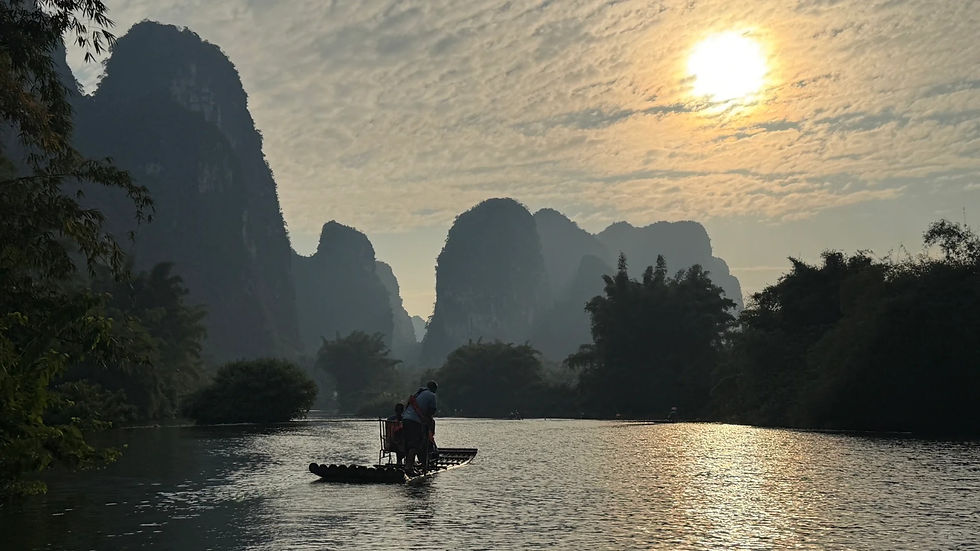October in Guilin & Yangshuo: Beyond the Picture-Postcard
- anywherechina020
- Jul 31, 2025
- 3 min read
Updated: Sep 8, 2025
The name "Guilin" conjures images so iconic, they risk becoming cliché before you even set foot there: mist-shrouded, impossibly green karst peaks piercing a jade river. Arriving with a guide's skepticism, I braced myself for potential disappointment, for the gap between fantasy and reality. What I found, however, was a depth and texture far richer than any postcard could capture. October, it turned out, was not just a backdrop; it was an integral, golden-hued character in the narrative.
My journey truly began not under the glare of midday sun, but in the hushed, ethereal light of dawn on the Li River. Boarding a traditional bamboo raft near Xingping, the tourist throngs felt worlds away. The air was cool and damp, carrying the faint scent of wet earth and river weed. As the first pale sunlight struggled through the lingering mist, those legendary peaks didn't just loom; they emerged from the gloom, profound and silent sentinels. It wasn't simply sightseeing; it felt like witnessing the world slowly exhale. Passing a solitary fisherman perched precariously on his narrow bamboo skiff, his cormorants resting patiently, it was a scene unchanged for centuries – a poignant reminder of the river's enduring rhythm amidst the modern boats that would soon follow.

The true revelation for me wasn't found solely on the water. Venturing into the rice terraces of Longji, October unveiled its practical magic. The slopes weren't just scenic; they were a hive of quiet industry. Gone were the brilliant emerald cascades of summer; instead, vast swathes of gold and amber ripened rice waited, heavy-headed, for the harvest. Watching local Zhuang and Yao farmers, bent low with incredible agility on impossibly steep inclines, carefully hand-scything the stalks, was humbling. Sweat beaded on brows despite the cool air, a testament to generations of symbiotic relationship with the demanding land. Later, sharing a simple meal cooked over an open fire by a local family – smoky, salty cured pork, impossibly fresh greens, rice so new it was almost sweet – I tasted the literal fruits of that labor. It was sustenance rooted directly in the terraced landscape outside the window.

Yangshuo, often the livelier counterpart to Guilin, offered a different kind of intimacy. While West Street buzzed with its familiar tourist energy, I sought quieter alleys. In the old village of Fuli, renowned for its painted fans, I stumbled into a tiny workshop where an elderly man, eyes gleaming with concentration, played a delicate, haunting melody on a pipa (lute). His gnarled fingers danced over the strings, the music echoing in the stone corridor – an unexpected, soulful interlude amidst the craft stalls. Another day, joining a small cooking class in a countryside home, I learned the alchemy of turning local staples into culinary poetry: pounding fiery chilies with garlic for a signature sauce, mastering the wok-toss for 'beer fish' (a local Yangshuo specialty), and the surprising skill required to wrap plump dumplings without leakage. The shared laughter and messy fingers fostered a connection deeper than any guided tour could provide.

Renting a bike to explore the Yulong River valley was perhaps the purest distillation of Yangshuo's charm. Pedaling along narrow paths flanked by sugarcane fields and golden paddies, framed on all sides by those ever-present karst teeth, felt immersive. Dodging ducks and nodding to villagers hauling produce on ancient tricycles, the pace slowed to match the land. I crossed ancient stone bridges, like the dramatic Dragon Bridge (Yulong Qiao), feeling dwarfed by nature's grandeur and human craftsmanship alike.

One late afternoon on the quieter upper reaches of the Li, my raft drifted silently past a submerged sandbar where a cormorant fisherman stood waist-deep. As the setting sun, filtered through a thin veil of mist, cast the scene in molten gold, I watched one of his birds surface, a gleaming fish wriggling in its beak. The fisherman reached down, expertly retrieved the fish, gave the bird a small reward, and sent it diving again. In that perfect, quiet light, the ancient partnership between man, bird, and river felt timeless, fragile, and profoundly moving – a dance perfectly choreographed by the rhythms of this unique land, unhurried by the passing world. It was the picture-postcard come alive, then deepened immeasurably by the silence and the understanding of its reality. These moments remind us that we are fleeting visitors, ghosts watching a timeless world, reflected perfectly on the jade water.



Comments